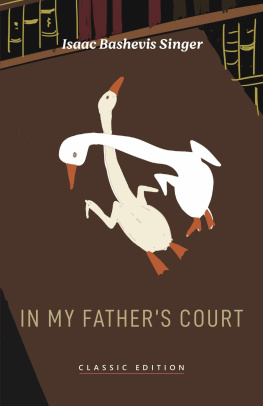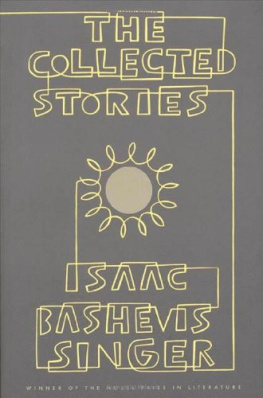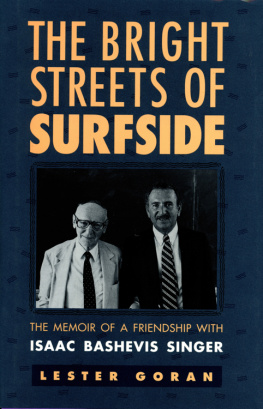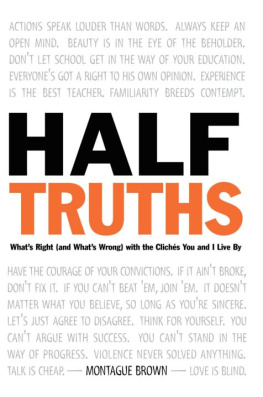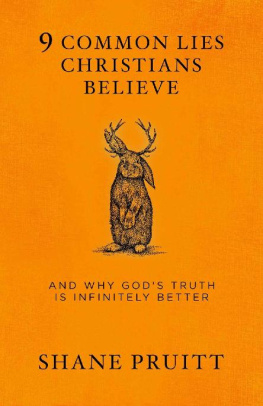Isaac Bashevis Singer - Old Truths and New Clichés
Here you can read online Isaac Bashevis Singer - Old Truths and New Clichés full text of the book (entire story) in english for free. Download pdf and epub, get meaning, cover and reviews about this ebook. year: 2022, publisher: Princeton University Press, genre: Detective and thriller. Description of the work, (preface) as well as reviews are available. Best literature library LitArk.com created for fans of good reading and offers a wide selection of genres:
Romance novel
Science fiction
Adventure
Detective
Science
History
Home and family
Prose
Art
Politics
Computer
Non-fiction
Religion
Business
Children
Humor
Choose a favorite category and find really read worthwhile books. Enjoy immersion in the world of imagination, feel the emotions of the characters or learn something new for yourself, make an fascinating discovery.

- Book:Old Truths and New Clichés
- Author:
- Publisher:Princeton University Press
- Genre:
- Year:2022
- Rating:4 / 5
- Favourites:Add to favourites
- Your mark:
- 80
- 1
- 2
- 3
- 4
- 5
Old Truths and New Clichés: summary, description and annotation
We offer to read an annotation, description, summary or preface (depends on what the author of the book "Old Truths and New Clichés" wrote himself). If you haven't found the necessary information about the book — write in the comments, we will try to find it.
Isaac Bashevis Singer: author's other books
Who wrote Old Truths and New Clichés? Find out the surname, the name of the author of the book and a list of all author's works by series.
Old Truths and New Clichés — read online for free the complete book (whole text) full work
Below is the text of the book, divided by pages. System saving the place of the last page read, allows you to conveniently read the book "Old Truths and New Clichés" online for free, without having to search again every time where you left off. Put a bookmark, and you can go to the page where you finished reading at any time.
Font size:
Interval:
Bookmark:
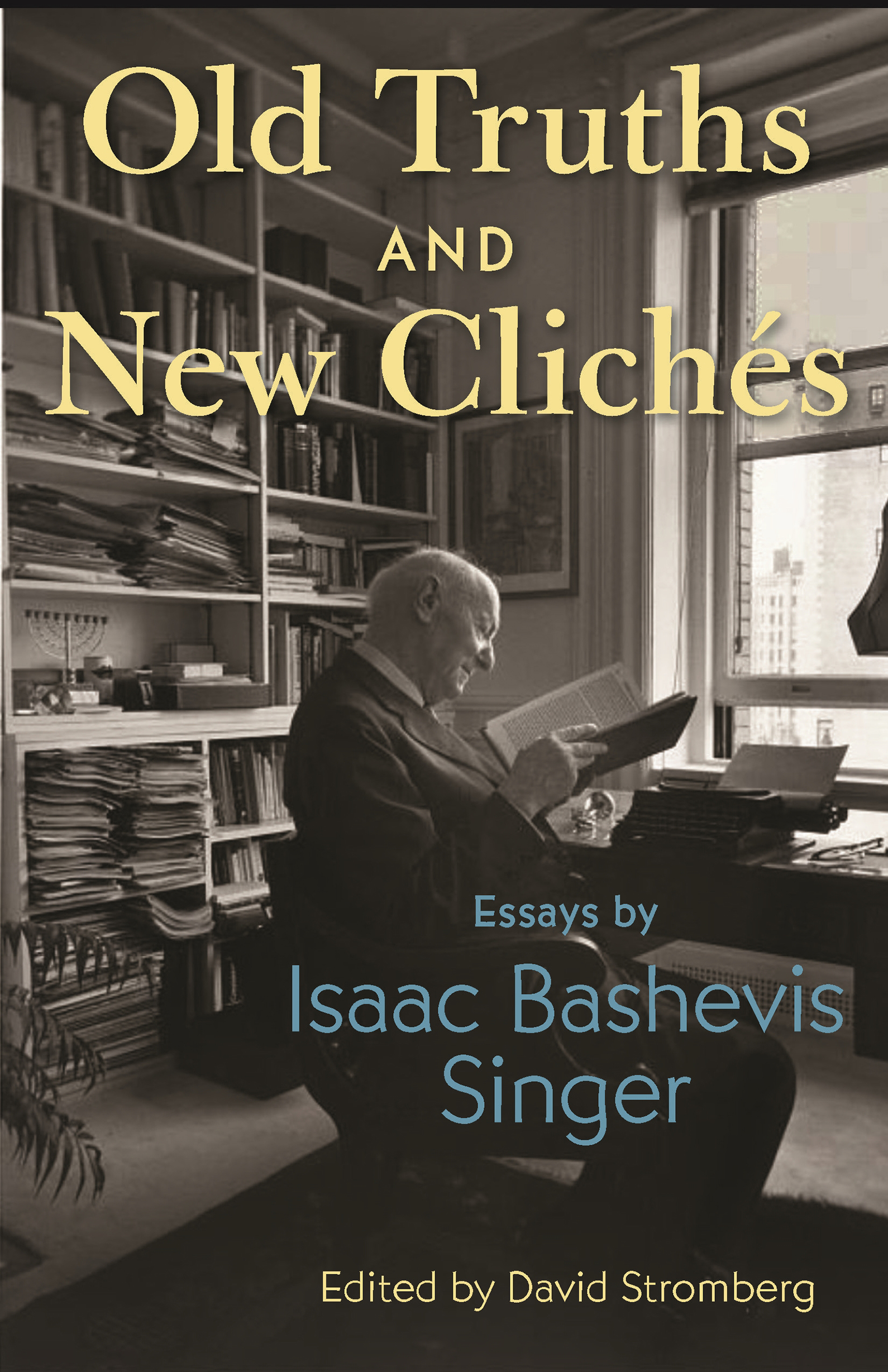
OLD TRUTHS AND NEW CLICHS
Old Truths
and
New Clichs
ESSAYS BY
ISAAC BASHEVIS SINGER
Edited by DAVID STROMBERG
PRINCETON UNIVERSITY PRESS
PRINCETON AND OXFORD
Copyright 2022 by The Isaac Bashevis Singer Literary Trust
Princeton University Press is committed to the protection of copyright and the intellectual property our authors entrust to us. Copyright promotes the progress and integrity of knowledge. Thank you for supporting free speech and the global exchange of ideas by purchasing an authorized edition of this book. If you wish to reproduce or distribute any part of it in any form, please obtain permission.
Requests for permission to reproduce material from this work should be sent to
Published by Princeton University Press
41 William Street, Princeton, New Jersey 08540
99 Banbury Road, Oxford OX2 6JX
press.princeton.edu
All Rights Reserved
Library of Congress Cataloging-in-Publication Data
Names: Singer, Isaac Bashevis, 19031991, author. | Stromberg, David, 1980 editor.
Title: Old truths and new clichs / essays by Isaac Bashevis Singer ; edited by David Stromberg.
Description: Princeton : Princeton University Press, [2022] | Includes bibliographical references and index.
Identifiers: LCCN 2021033990 | ISBN 9780691217635 (hardback ; acid-free paper)
Subjects: LCSH: Singer, Isaac Bashevis, 19031991Translations into English. | LCGFT: Essays.
Classification: LCC PJ5129.S49 O43 2022 | DDC 839/.143dc23
LC record available at https: / /lccn.loc.gov/2021033990
eISBN 9780691238982
Version 1.0
British Library Cataloging-in-Publication Data is available
Editorial: Anne Savarese and James Collier
Production Editorial: Ellen Foos
Text Design: Karl Spurzem
Jacket/Cover Design: Pamela L.Schnitter
Production: Erin Suydam
Publicity: Kate Hensley and Carmen Hensley
Copyeditor: Jodi Beder
Jacket image: Isaac Bashevis Singer, 1978. Yousuf Karsh
To the blessed memory of Israel Zamir (19292014)
- ix
This volume offers a representative collection of Isaac Bashevis Singers essays on those topics and themes that characterized his literary career. It is neither a definitive edition of his essayistic writing nor a facsimile of archival materials. Instead this collection brings together essays selected for translation into English by Singer himself. And while it does not replace archival research, the volume gives readers insight into the different stages of Singers creative process and intellectual development.
Many of these essays were presented as lectures. In a few cases, the published Yiddish originals show that Singer intended, during the composition, to read the essay aloud to a live audiencethough the piece was printed in a newspaper, the text directly addresses a group of listeners who are not there. This means that Singer was consciously composing in Yiddish a text that he knew had a target audience who understood only Englishand that its Yiddish publication was only one step in its final form. Singer was also involved in every stage of their translation, either translating himself orally while a collaborator typed up his sentences, or correcting translations made by others.
It is possible, then, to read these texts not quite as translations, but as original works produced through a process that included a first draft in Yiddish, translation into English, and English-language revisions made by Singer alonesometimes undergoing two, three, or more drafts, with corrections or additions that do not appear in the original Yiddish texts. The final piece in the collectiona rhymed poem written and corrected in the original Englishreveals Singers own compositional tendencies in his second language. In this sense, this book is more than a collection of Singers translated articles. It is a cohesive work, expressed in Singers own voice.
Singer was a modular thinker. The topics and themes of his essays can be generally separated into the three categories making up the parts of this collectionthe literary arts, Yiddish and Jewish life, and personal writings and philosophywith each mode incorporating aspects of the others. Yet Singers thinking was modular within each category too, so that over his long careerspanning more than sixty yearshe often developed, expanded, and shifted intuitions or convictions he had held from the very beginning. With this in mind, the pieces in this volume are those that reflect the most expanded and nuanced take on their topic. They are included because they express a central element of Singers intellectual foundationa testament to the spirit of his artistic vision.
David Stromberg, Jerusalem
AN INTRODUCTION TO THE ESSAYS OF ISAAC BASHEVIS SINGER
Isaac Bashevis Singer has long been acknowledged as a master storyteller. But his critical writings have been largely passed over. One underlying reason is the sheer volume of Singers output. Starting in 1939, when he became a regular contributor to the Yiddish daily Forverts, he produced an incredible amount of text. He published his work under at least three pseudonyms, any number of which might appear in a single issuesometimes on a single pagein a variety of genres: stories, novels, memoirs, essays, literary sketches, satires, dialogues, travel pieces, reviews, and even a popular media digest.
In the early 1960s, as his popularity grew, Singers Yiddish-language production was increasingly accompanied by efforts to translate, edit, and adapt his work for English-speaking audiences. By then, he had accumulated untranslated material from nearly forty years of writing, and was still producing new material, including some of the works for which he would be best known. He also began to appear as a lecturer, traveling to universities, synagogues, community centers, and retreats all across the United States, giving talks on everything from literature, to Kabbalah, to his own concept of religion. It was, as Singer told Harpers in 1965, a lot of work for a man of sixty. Indeed, it seemed the literary and intellectual factory that became Isaac Bashevis Singer never stopped for breath.
Yet the amount that a given person can write is always limitedand not only by the number of days they are destined to live on the planet. Singers creative process, which came to include a practice of writing, translating, and editing, was limited by how much English-language text he could prepareespecially since he often did the translations himself with a collaborator, or, less often, supervised and corrected translations made by others. He was also limited by the number of books his publisher could consider, print, advertise, and distribute at any given momentin part because of the risk of saturating the market with his works. All these issues may seem superfluous where the noble issues of art and literature are concerned. But they are quite relevant in considering Singer, whose full career as a writer is traced only when taking into account all of his publications in the Yiddish press, and whose book publicationswhether in Yiddish or in English, the two languages in which he worked with equal authorityreveal only a partial view of his artistic output.
This partialness becomes especially clear when considering Singers essays. The way that these essays were written, translated, edited, and, in some cases, presented to audiences, reflects the central role they played in Singers literary life. Many of them first appeared under the pseudonym Yitskhok VarshavskiIsaac from Warsaw, which Yiddish readers could have recognized as Yitskhok Bashevis, since he openly cited the real titles of his best-known worksand some under his other pseudonym, D. Segal. Yet after being translated, edited, and rewritten in English, they all appeared under the name Isaac Bashevis Singer. The final manuscripts left behind, as well as drafts used to prepare them, provide some of the clearest views into Singer as a literary artistone who is able not only to produce fiction that captivated readers, but also to discuss the aesthetic, spiritual, and moral vision undergirding all of his writing. The essays also reflect the ideas that drove his literary production. In this, they are an embodiment of his accomplishment twice over.
Font size:
Interval:
Bookmark:
Similar books «Old Truths and New Clichés»
Look at similar books to Old Truths and New Clichés. We have selected literature similar in name and meaning in the hope of providing readers with more options to find new, interesting, not yet read works.
Discussion, reviews of the book Old Truths and New Clichés and just readers' own opinions. Leave your comments, write what you think about the work, its meaning or the main characters. Specify what exactly you liked and what you didn't like, and why you think so.

